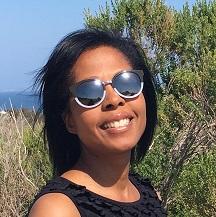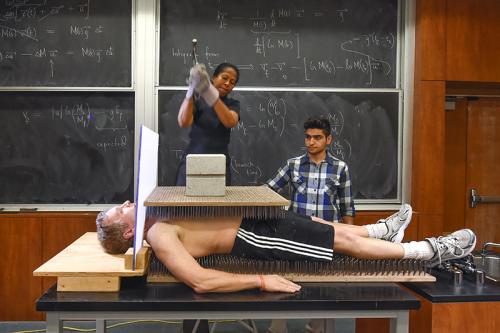 The Physics Department welcomes a new Demonstrations Manager, Angella Johnson. Angella graduated with a Bachelor's degree in physics from Temple University and a Master’s degree in Building Science-Architectural Studies from the University of Southern California. She joins us from USC where she worked as the Lecture Support Lab Manager/Engineering Technician II for fourteen years.
The Physics Department welcomes a new Demonstrations Manager, Angella Johnson. Angella graduated with a Bachelor's degree in physics from Temple University and a Master’s degree in Building Science-Architectural Studies from the University of Southern California. She joins us from USC where she worked as the Lecture Support Lab Manager/Engineering Technician II for fourteen years.
What influenced you to choose this career path?
So honestly I didn't even know a job like this existed. What got me interested in physics was optics and lasers when I took a class with my first female physics professor and it was just so interesting. It really grabbed my attention. I figured I would want to work in academia but I wasn't sure of what I would do. I stumbled upon this career while I was at UCLA and I knew I wanted to stay in academia. As a physics grad student I remembered being a TA and thought it can't be that much different. But now that I've done it for so many years, I think physics demonstrations are really great. It's wonderful for students who can’t grasp certain concepts to actually see it since we all retain information differently. Some of us are visual, some are auditory and some are tactile learners. Demonstrations are a combination of things. You can write an equation but if you can actually see the physics, hear, or touch it, that makes the learning experience more profound.

What made you want to study physics?
I was at Temple University not sure what I wanted to do. I thought about speech pathology and audiology and in order to complete that program I had to take a class in acoustics which was in the physics department. I remember going into an anechoic chamber and I thought it is really cool. I had started to stray away from audiology and pathology. I realize that I did not want to do it for the rest of my life. At that time, I met Prof. Lyrra, who encouraged me to pursue physics. Prof. Lyrra, was the first female professor in the department, and her research was in experimental Atomic, Molecular and Optical Physics. She encouraged me to take her course in optics and invited me to work in her undergraduate lab. That’s how it all started. From speech pathology and audiology to acoustics then optics. I was sold!
That seems to be a valuable encounter and a life changing experience. Can you share more about your undergraduate experience?
Everything changed for me after that. I thought, wow the things you can do with lasers! Surgery, military purposes, just amazing. At that time there was a lot of attention around Dr. Lyrra and I was really drawn to her. I took a lot of classes where I was the only female and many times the only minority. I actually had a professor tell me that you are a double minority, you’re either going to make it work for you or it’s going to work against you. Being a double minority gave me the fuel I needed and the boost to continue moving forward. It wasn’t until I attended an event held by the National Society of Black Physicists that I saw a place for someone like me in science.
What are you looking forward to working at Brown?
The very first day I got a tour and this may be geekish but he (Bob Horton) showed me so many cool labs. I’m looking forward to getting to learn more about the research happening in the department and diving more into the instructional labs. Also, the campus is so beautiful, I’m looking out the window now and it’s just gorgeous. It’s so different from Los Angeles but at this point in my life, this is what I need.
COVID has obviously disrupted a lot of what you would have come into during a normal academic year. Are there things that you think will be challenging for you in the next few months, especially in the spring semester?
I have some big shoes to fill. Before me it was Jerry Zani and before that it was Dean Hudek. I think it’s good and it’s challenging, there are pluses and minuses. I expect the spring will be some sort of hybrid situation. The whole instructional lab here works differently from where I’m coming from, it’s much more team oriented. I’ll have to figure out who will request demos, when they will request it and what are their favorites. That’s going to take time to understand. With COVID it’s going to be a challenge, I would just ask that professors be patient with us as we figure it out.